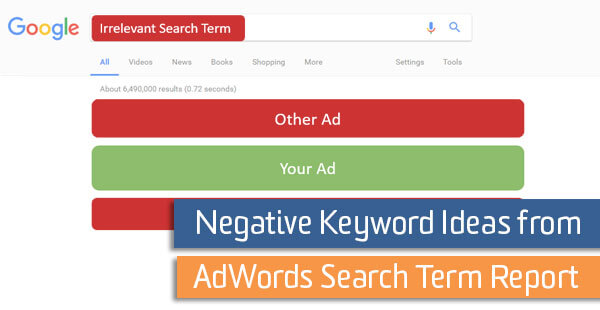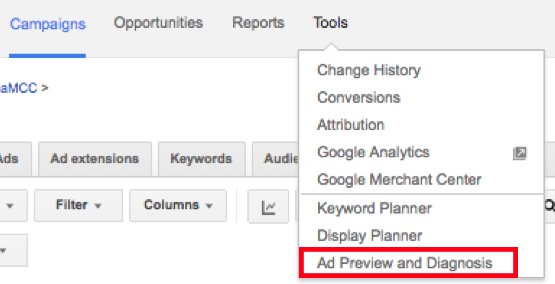Negative Keyword Ideas From AdWords Search Term Report

Using a carefully constructed negative keyword list can have a positive impact on your AdWords account, and today’s post is going help you brainstorm about new keywords to include in your negative keyword strategy.
If you aren’t using negative keywords currently, you definitely should. For one, it helps you control your spend. You are narrowing down which search queries you want to place your bids on, and therefore are only spending money where it makes the most sense.
Now to quote every infomercial ever: but wait, there’s more! Using negative keywords efficiently can also increase the click-through rate of your ads, because your ad would be more relevant to the queries you are matching into. The increase of expected click-through rate then rolls into a higher quality score, which can then lower your cost-per-click.
The takeaway is by effectively using negative keywords, you can make the most of your budget. We’ve written about negative keywords in the past (check those out here and here), but this post will talk specifically about using the search term report.
Generating Keywords
So how do you come up with different ideas for negative keywords? The best way is to use the search term report in AdWords, which my coworker has written about here. I’m going to help you pick out new negative keywords that you may not have thought to exclude after reviewing your search term report. Let’s get down to business.

To defeat the irrelevant search queries.
Terms That Don’t Indicate an Intent to Purchase (or Convert)
An easy example that applies to almost every industry and AdWords account is the term “free” or other keywords that suggest the user isn’t looking to spend their money. Users searching for a “free calculator” or an “online calculator” are probably are not interested in buying a physical calculator, so you can pocket some of your daily spend for other searches geared towards purchasing a physical calculator. Unless your product or service is free, it is probably best to take these types of searches out of the equation (pun intended).
Additionally, search terms that suggest the user is looking for information regarding the type of product or service can be hard to monetize. These search queries often contain phrases like “what is” or “pros and cons.” For example, a person searching for “side effects of laser hair removal” may be not be interested in a 50% off coupon just yet.
Saving your spend for targeting individuals that are further down the marketing funnel will help you obtain better conversion rates and higher return on ad spend.
Keywords Used in Other Campaigns and Ad Groups
Sometimes after you spend time building out multiple campaigns in AdWords, each with their own focus on different variations of your products or services, Google serves the wrong ad for a search query. So what gives? Chances are that you have overlapping keywords, which can happen often if you are using each of the keyword match types.
Let’s say we created a campaigns for a New York City real estate company and we had keywords for “1 bedroom nyc apartments” in one campaign, and had a catch all campaign that included more generic keywords like “downtown nyc apartments.” Without the appropriate negative keywords, if I search for “1 bedroom nyc apartments downtown”, Google will serve the ad from whichever ad group that would cost us more money.
This is where adding negative keywords can straighten things out. Including negative keywords related to one bedroom apartments to our more generic campaign would insure that we are able to deliver the most appropriate ad to the user.

There are multiple ways to check to see if you have overlapping keywords in your account. You can use the Adwords Editor application to find duplicate keywords. You can also use the Ad Preview and Diagnosis tool in the Tools section in AdWords.
Competitor or Branded Search Queries
It is common to see AdWords accounts that are built out with competitor and brand campaigns so they can better control the spend for these terms. This is because competitor terms are going to require a much higher cost-per-click than the nonbranded variant, thus will rapidly consume a daily budget. Alternatively, branded terms should be fairly cheap, but if you have a high amount of traffic navigating to your site, the cost could also add up quickly.
In AdWords campaigns that are not focused on these keywords, it is best to negative match competitor and branded queries, so that you have better control of spend and have an easier time looking at reports. And if you have the time and the budget, you should consider building out each or one of these concepts into campaigns.
Wrapping Up
Hopefully you have found new negative keyword ideas you wouldn’t have thought about excluding before. Just one last bit of advice: if you ever question whether or not a search query is relevant to your ad, ask yourself, if I searched this query, would I click my own ad to solve the problem I am searching for? And once there, would I likely convert? If not, it is probably best to save your money and their time and negative match that search query.
It is also good to note that in the search term report you will only see search queries that, to quote Google, “were used by people at least 8 hours ago and have either received clicks in the past 30 days or were searched for by a significant number of people.” They also mention that any search terms which don’t match that criteria will be summed together in the ‘Other search terms’ row, at the bottom of the report.


